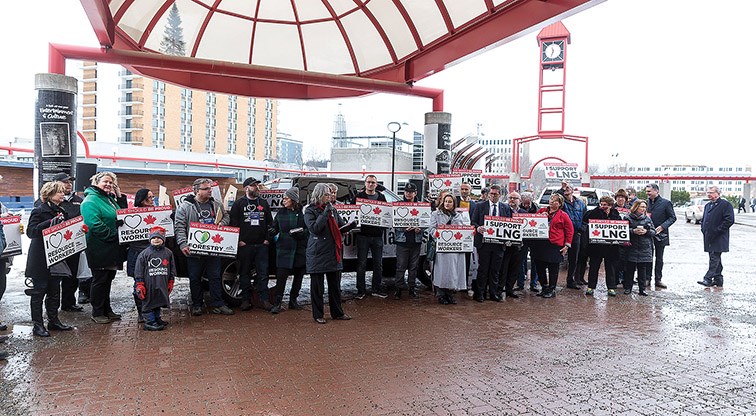Approximately 50 people came out to show their support for natural resource sector workers at a rally outside the B.C. Natural Resources Forum.
On Jan. 29, a convoy of trucks, service vehicles and other vehicles made its way to the Prince George Conference and Civic Centre. The convoy was prevented by police from parking outside the centre, but the rally -organized by Resource Workers United and The North Matters - drew a small crowd on foot in Canada Games Plaza.
"We are the providers and protectors of our community. We are here to tell outsiders who are paid to block our opportunities, 'we got this,'" The North Matters founder Dave Johnston said during the rally. "Let's start standing up in unity."
People living in the urban parts of Canada, and those concerned about the environment, need to understand that, "Canadian resources are not your enemies," speaker Trudy Klassen said.
Canada's natural resources and the people who work them are the country's greatest asset, Klassen added, and should be a source of pride.
And, if Canada isn't providing those natural resources to the world somebody else will, she added, and likely without the same high environmental standards.
"We are proud, we don't want handouts or extended EI benefits," Klassen said. "Maybe we'd get more sympathy if we were listed as an endangered species."
Hereditary Chief Helen Michelle of Skin Tyee Nation, part of the Wet'suwet'en, said not all members of the Wet'suwet'en are opposed to the Coastal GasLink (CGL) natural gas pipeline project. Some of the Wet'suwet'en hereditary chiefs and their supporters have issued an "eviction notice" to the company and have built a blockade on Morice West Forest Service Road southwest of Houston, B.C.
"I support CGL. It's an opportunity for us as well," Michelle said. "And when CGL came to meet with us, we had lots of consultation."
As a hereditary chief since she was a teenager, Michelle said she cares about her people, their traditions and their land.
"We were raised and born in the very territory," she said. "I love our traditional territory, I don't want any damages (to it). (But) I'm totally aware of how my people feel with no jobs."
The pipeline is an economic opportunity for her people, she said.
"Today I really enjoy the gas I used in my vehicle," Michelle added. "I'd get pretty cold without that fuel."



